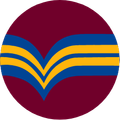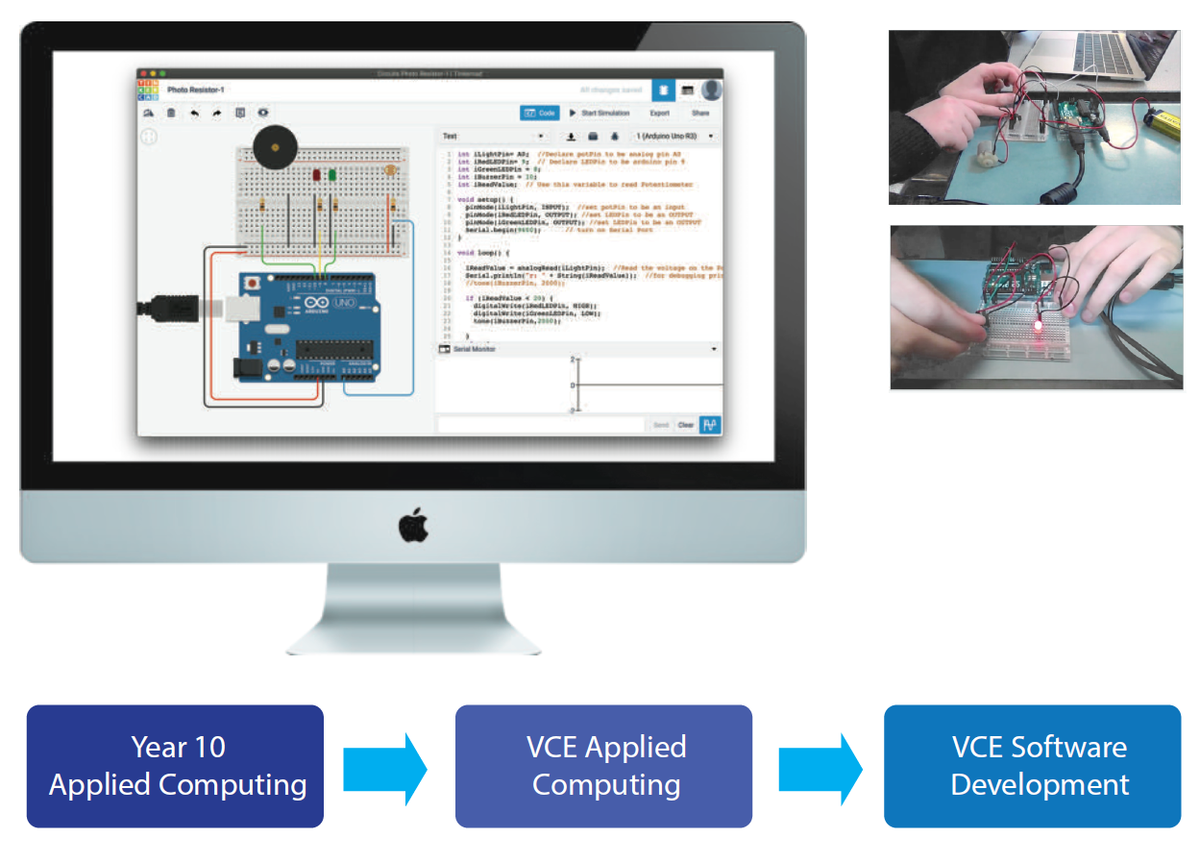Year 10 Design & Technologies

Design & Technologies Electives (Semester Based) | |
|---|---|
| Applied Computing | Food Studies |
| Emerging Technologies, Systems & Design | Product Design & Technology (Wood, Metal, Plastic) |
| Project Runway | Master Chef |
Applied Computing
Semester Overview
Applied Computing elective provides students with the framework and foundation to continue the study into VCE Computing. This exciting new area of study explores how our lives are impacted by technology for now and the future, and provides students with an understanding of the technical underpinnings of information systems in a range of settings. The study is divided into three areas; digital systems - the roll of hardware and software in managing data in networked systems; data and Information – the processes involved in manipulating data to form information; and creating digital solutions – using data structures and programming techniques to solve problems.
Students will have an understanding of the interactions between computer hardware, software and users. Students will examine the key hardware components that are required for communications, storage, processing and retrieval of data.
Students will develop skills and confidence in coding through web page development, applications development and algorithm design to solve more complex problems. Students will be working individually and collaboratively in small teams to complete enquiry-based projects of their own choosing. Examples may include 2D or 3D games development, robotics, web-applications or other areas of computing. Students will develop their understanding of digital citizenship by engaging in online forums and knowledge bases to assist them with their projects.
Students will be able to:
- Work independently in enquiry-based ICT projects to achieve set outcomes
- Recommend appropriate computer hardware for a range of settings, taking into consideration: networking, security, hardware and software limitations
- Use “real-time” collaborative software applications to support high quality communication with their peers and online communities
- Model computational thinking through pseudo code
- Develop skills in logical and analytical reasoning to write computer code (programming) for desktop, mobile or microcontrollers (robotics / STEM projects - Arduino or Raspberry Pi), 2D or 3D games.
- Use industry standard web-page coding to build functional web pages
- Identify impacts and strategies to manage privacy, ethical and legal obligations in relation to selected information systems.
Emerging Technologies, Systems & Design
Semester Overview
Students create and design objects related to students interest such fashion accessories, technological toys, entertainment systems, sustainability solutions, mechatronics, bio-technological products.
Students will develop a sound understanding of the new and emerging technologies, such as Additive manufacturing and design, Robotics and Automation. Students will aim to become proficient in the use of new technologies such as 3D Printing, designing and 3D Scanning. Student will also learn to solder and use other emerging technologies such as laser cutters. This course will also introduce students to concepts of mechanical, electronic engineering, energy transformation and energy management and its role in sustainability. Students will apply design thinking as they apply their learning to the development of integrated projects to design solutions. This course forms a pathway to VCE Systems Engineering, a bonus subject for entry to engineering courses in Victoria
Students will learn:
- The workings of a 3D Printer and its advantages and limitations
- To design using TinkerCAD or Autodesk Fusion to design creative prototypes (depending on your proficiency)
- To use a 3D scanner
- To use a laser cutter
- The basic concepts of Mechanical systems
- The basic concepts of electronics and the skills in using tools such as soldering irons.
- To develop simple Robotics systems and develop an understanding of the functionality of a robot to enhance human efficiency
- How energy transformations take place and the role of new technologies in impacting energy efficiency and sustainability
- How to apply design thinking and project management skills to produce a functional prototype as a solution for some open ended challenges for global issues.
Students will be able to:
- Become critical users of technologies, and designers and producers of designed solutions
- Investigate, generate and critique designed solutions for sustainable futures
- Use design and systems thinking to generate innovative and ethical design ideas, and communicate these to a range of audiences
- Create designed solutions suitable for a range of contexts by creatively selecting and safely manipulating a range of materials, systems, components, tools and equipment
- Learn how to transfer the knowledge and skills from design and technologies to new situations.
- Understand the roles and responsibilities of people in design and technologies occupations, and how they contribute to society.
Project Runway
Semester Overview
This subject aims to develop the student’s knowledge and skills of garment design and construction. Students design and create an original garment, such as a shirt, or skirt based on their own individual design brief. At this level, there is emphasis on individual expression of ideas and creative, ethical and sustainable use of materials. The techniques they will learn may involve complex skills such as computer aided design. During this process, they learn to manipulate a pattern and apply appropriate construction methods. This course creates a pathway to VCE Product Design and Technology – Textiles.
Students will be required to:
- Investigate current fashion trends. They will develop an individual design brief and select appropriate materials, tools and equipment in order to develop design ideas.
- Design a range of fashion garments based on their design brief. They will also design an advertisement for the target market.
- Produce a finished garment using appropriate technologies and processes.
- Evaluate their finished garment against comprehensive criteria for success recognizing the need for sustainability.
- Plan and manage projects individually, taking into consideration time, cost, risk and production processes.
Subject to a materials charge. Please refer to the Materials Charges document for indicative costs.
Food Studies
Semester Overview
Food Studies is the elective for you if you would like to develop skills in food, nutrition, and producing a variety of innovative and creative dishes. You will expand upon your existing cooking abilities while working collaboratively with others. You will also develop an appreciation of current ethical issues which influence food choices. Student voice is an important component of course development activities which may vary each semester. Coursework may include excursions to small scale food manufacturing facilities and produce markets.
Students will:
- Investigate and make judgements on how the principles of food safety, preservation, preparation, presentation, and sensory perceptions influence the creation of food solutions for healthy eating.
- Critically analyse factors, including , nutritional value, social, ethical and sustainability considerations, that impact on designed solutions and the design and production processes involved.
- Apply design thinking, creativity, innovation, and enterprise skills to develop, modify and communicate design ideas.
- Develop production plans to plan and manage, both individually and collaboratively, taking into consideration time, cost, risk, and production processes.
- Develop a wide variety of production skills and food presentation styles.
- Identify and establish safe and hygienic work methods.
Subject to a materials charge. Please refer to the Materials Charges document for indicative costs.
Product Design & Technology (Wood, Metal, Plastic)
Semester Overview
The Year 10 course aims to introduce students to the different structural properties of a range of materials such as solid timber and veneered plywood and composite boards, metals and plastics. Students investigate the properties of these materials and refer to Australian Standards when investigating their use. Students will be given the opportunity to select appropriate materials to meet specified product design requirements. The course aims to develop student knowledge of the product design process and build skills and understanding in the use of simple and complex equipment to construct a range of products using different materials, according to specific criteria outlined in design briefs.
Students will learn about:
- critiquing the design of an existing product to identify environmental consequences of material selection.
- justifying decisions when selecting from a broad range of technologies − materials, systems, component, tools and equipment. For example, selecting low-emission paints and locally sourced materials.
- analysing and explaining the ways in which the properties and characteristics of materials have been considered in the design of products with specific requirements such as minimising size and weight for distribution.
- investigating emerging materials and their impact on design decisions.
- Investigating - Critique needs or opportunities to develop design briefs and investigate and select an increasingly sophisticated range of materials, systems, components, tools and equipment to develop design ideas.
- Generating - Apply design thinking, creativity, innovation and enterprise skills to develop, modify and communicate design ideas of increasing sophistication.
- Producing - Work flexibly to safely test, select, justify and use appropriate technologies and processes to make designed solutions.
- Evaluating - Evaluate design ideas, processes and solutions against comprehensive criteria for success recognising the need for sustainability.
- Planning and managing - Develop project plans to plan and manage projects individually and collaboratively taking into consideration time, cost, risk and production processes.
Subject to a materials charge. Please refer to the Materials Charges document for indicative costs.
Master Chef
Semester Overview
Fancy yourself as the next Heston Blumenthal or Jamie Oliver? Chefs are just mad scientists in disguise! Use your culinary skills and imagination to create incredible dishes from Master Chef mystery boxes as well as participating in class challenges!
This subject is designed to give you more choice in your learning and encourage you to become independent and critical thinkers using design options. At the same time, it will base its content on topics that will lead into VCE Food Studies.
Design briefs will be more complex and challenging. Students will become aware of different cultures/ingredients (including native Australian ingredients), current food trends and explore the challenges of feeding a growing global community in the future.
Students will:
- Develop plans and manage projects individually and collaboratively taking into consideration time, cost, risk assessment and production processes.
- Critically analyse factors, including social, ethical and sustainability considerations, that impact on designed solutions for global preferred futures.
- Investigate current food trends and their influence on Australian eating habits.
- Investigate cuisines from around the world and their influence on Australian cuisine.
- Investigate and design your own food products from mystery items.
- Research and demonstrate methods to modify recipes to improve nutritional content in line with the Australian Dietary Guidelines and AGHE.
Subject to a materials charge. Please refer to the Materials Charges document for indicative costs.

